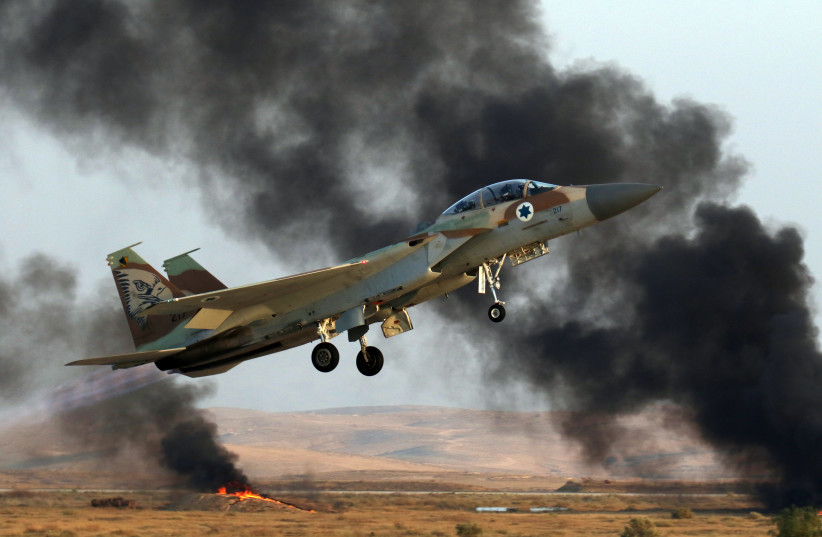Israel is a wonderful country divided into thirds, goes an old joke.
One-third of the country does the army, one-third works, and one-third pays taxes. And the problem? It’s the same one-third.
An exaggeration? Of course. But the joke works because it contains a kernel of truth.
It is those who view themselves as that one-third of the country that works, goes into the army and pays taxes who took to the streets across the country again on Thursday, and have been taking to the streets for the past two-and-a-half months in rage against the judicial reform.
One middle-aged man, who identified himself only as Oren, who was wrapped in the national flag and was among those protesting outside Ben-Gurion Airport on Thursday morning, told a KAN News reporter: “They picked the wrong group to fight with. This is a group that does reserve duty, pays taxes, that just wants to live here quietly, get up to go to work and enjoy life.”

It is that group – a group that considers itself the backbone of the country and the salt of the earth – that feels the state is being stolen by a coalition that includes large segments of the population that does not “carry its weight” and is led by an indicted prime minister.
A battle over more than judicial reform
Make no mistake, the rage that has exploded on Israel’s streets is about judicial reform. But it is not only about judicial reform.
This is the latest battle in an ongoing culture war that has been waged here intermittently since the country’s inception. This time, however, the combatants do not fall – as they often have in the past – into neat pigeonholes: Right vs Left, Ashkenazi vs Mizrahi, religious vs secular. Rather, it is being waged by those who feel they are forward-looking, democratic, modern and the inheritors of the true Zionist ethos vs those they feel are anything but.
MANY WEAPONS have already been deployed in this battle: massive demonstrations, threats of emigration, pulling money out of the country, and appeals to external actors – Diaspora Jews, the US government – to “save Israel from itself.”
This week another weapon appeared on the battlefield in ways not seen since this current battle began in earnest on January 11 when Justice Minister Yariv Levin launched his judicial revolution: the threat of reservists, most significantly pilots, to refuse to show up for reserve duty.
IDF service refusal as a protest isn't new – why is this different?
Refusal to serve, refusal to show up for reserve duty, or refusal to partake in certain operations while in the army – serving in Judea and Samaria on the one hand, or uprooting settlement outposts on the other – is not new in this country. In fact, refusal to serve or carry out specific orders goes as far back as the Altalena, when some fighters refused David Ben-Gurion’s order in 1948 to fire on the Irgun’s arms ship.
For instance, in March 1978 – just 10 months after Menachem Begin was elected prime minister – 348 officers and soldiers sent him a letter while he was in the midst of negotiations with the Egyptians saying that “it would be difficult for them to identify with the State of Israel’s actions” if his government preferred Greater Israel to peace with Egypt. The veiled threat was understood.
During the First Lebanon War in 1982 there were numerous collective cases of soldiers refusing to serve. For instance, more than 3,000 reservists signed a declaration in the first month of the war saying they would refuse to serve in Lebanon; and during the course of the war, entire reserve units refused to take part.
A not insignificant number of reservists refused to serve in the West Bank during the First Intifada, which began in 1987, and at the height of the Second Intifada more than 50 duty and reserve officers sent a letter to then-prime minister Ariel Sharon saying that they would no longer “fight across the Green Line to control, expel, starve and humiliate an entire nation.” This was followed by a letter to Sharon from 27 reserve pilots who said they would refuse to implement targeted killings. Sharon’s close adviser Dov Weissglas would later admit that these initiatives were one key factor in Sharon’s decision to withdraw from Gaza.
UDI LEBEL, a researcher of civil-military relations at Bar-Ilan University’s School of Communication and at its BESA Center for Strategic Studies, wrote in a 2012 academic paper that “strategic military refusal became a left-wing political tool for imposing policies on right-wing governments.”
Lebel cited the examples above and wrote that since the Likud’s rise to power and the start of the First Lebanon War, “strategic military refusal was explicitly intended to be used to bypass the parliamentary arena and influence security policies.”
And, he said in an interview this week, it always worked. The actions against the Lebanon war led ultimately to its termination; protests during the First Intifada led the army to develop a code of ethics for fighting there and helped push Yitzhak Rabin into the Oslo process; and the demonstrations during the Second Intifada had a direct impact on the decision to withdraw from Gaza. In short, soldiers using their leverage are not new to Israel’s landscape. What, if anything, is different this time?
“This is the first time that these actions are being threatened not in relation to a military action. This is the first time it is not meant to influence security policy.”
Udi Lebel
Lebel’s reply: “This is the first time that these actions are being threatened not in relation to a military action. This is the first time it is not meant to influence security policy.”
The officers, pilots, and soldiers who have signed letters saying they will be unable to serve in reserves if the judicial reform is passed are using their considerable leverage not to impact the army, but to affect government policies on matters unrelated to military policy. This is what is new; it is not something that has been done in the past.
It also makes the situation more difficult to defuse. In the past, Lebel said, if there were threats of refusal over specific actions or policies, the army could make the necessary adjustments. This time, however, those adjustments need to be made by the government, and it is not as if the chief of staff can force Levin to withdraw his plan or force the haredi parties to remain in the coalition if he does.
Lebel said the strategic refusal by reservists and soldiers has worked so well in the past because the IDF – and Israeli society as a whole – recognizes the importance of, and wants to preserve the IDF as, a “people’s army.”
That means that it is willing to give in to various demands to ensure that the army remains part of an Israeli consensus, something that all can join regardless of their religious or political outlooks.
Lebel said that this “people’s army ethos” has led to something that is not seen as much in other armies, “selective conscientious objection.” Conscientious objectors refuse to go into the military on religious or moral grounds. Selective conscientious objectors are those who go into the army but are unwilling to perform specific duties. It may be left-wing soldiers unwilling to participate in operations in the West Bank, or religious soldiers who will refuse to uproot settlement outposts.

The IDF has proven itself able to accommodate those demands, and it is something – a study he conducted in 2015 has shown – most of the population wants it to be able to do. Most Israelis, he said, favor the IDF being willing to exempt soldiers from duties they feel uncomfortable doing because of political reasons, in order to ensure that the IDF remains a place where everyone can serve.
Lebel said that wanting to preserve the army as a people’s army opens it up to significant pressure by segments of the population opposed to one policy or another.
For example, after the Vietnam War the US fundamentally altered its military structure, moving from a conscript army to an all-volunteer one. Lebel said one of the main reasons was that the draft opened the army up to a situation where its policies were dictated by large segments of the population that refused to serve. Making service voluntary removed that as a threat.
IN ISRAEL, however, the value of keeping the army as a people’s army has been deemed a worthy enough ideal to be willing to pay the price of giving in to this leverage from time to time. To reduce that leverage, he said, the army recognized the need to “give exemptions to individual soldiers where operational missions run counter to the soldier’s conscience.”
The hope was that this “would eliminate the phenomenon of ‘strategic refusal’ – the attempt to shape military policy using threats of collective conscientious objection. The rights of the individual soldier with regard to the boundaries of his obedience would be recognized, and soldiers from a different group could carry out the mission to which he objects.”
That was the hope. However, the pilots’ threats not to show up for reserve duty indicate that the IDF remains exposed to cases of “collective conscientious objection.” Lebel pointed out that the pilots’ threat of refusal is more symbolic than anything else, since it is clear that a squadron of reserve pilots – and it is not even clear how many among them actually still take part in sorties – is not going to affect the IDF’s operational abilities.
Yet the IDF cannot ignore the pilots, because they have status and moral authority in the society, and “if they say we are not coming, no one knows exactly how many people will look up to them and stay home as well.”
In this regard, Lebel compared the pilots – and their impact on the army’s upper brass – to a group of respected religious-Zionist rabbis who may sign a letter telling religious soldiers not to uproot settlement outposts.
“There has never been a government that has not taken this type of thing into account,” he said. No one knows how many people might heed these types of calls, and no government wants to take the chance that the numbers could be significant.
Asked whether this means that the army is held hostage by various segments of the population, Lebel replied, “As long as the model here is the people’s army, this weapon – what I have called military blackmailing – exists.”
This weapon is now being deployed openly in the battle over judicial reform, and if the past predicts the future, it could very well work to alter policy. If, as Lebel argues, keeping the army a people’s army is currently Israel’s supreme value, then preserving the IDF as such may ultimately trump everything else – including steamrolling through the judicial reform as is. •
